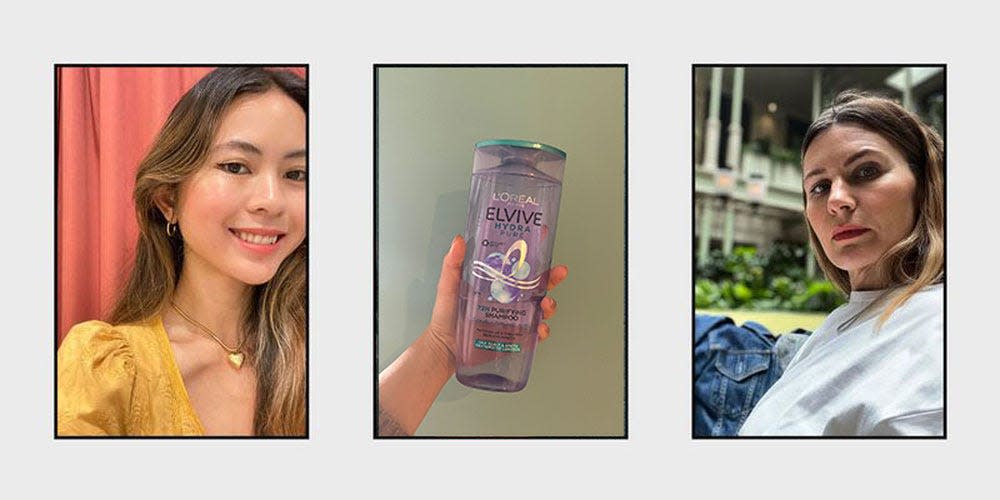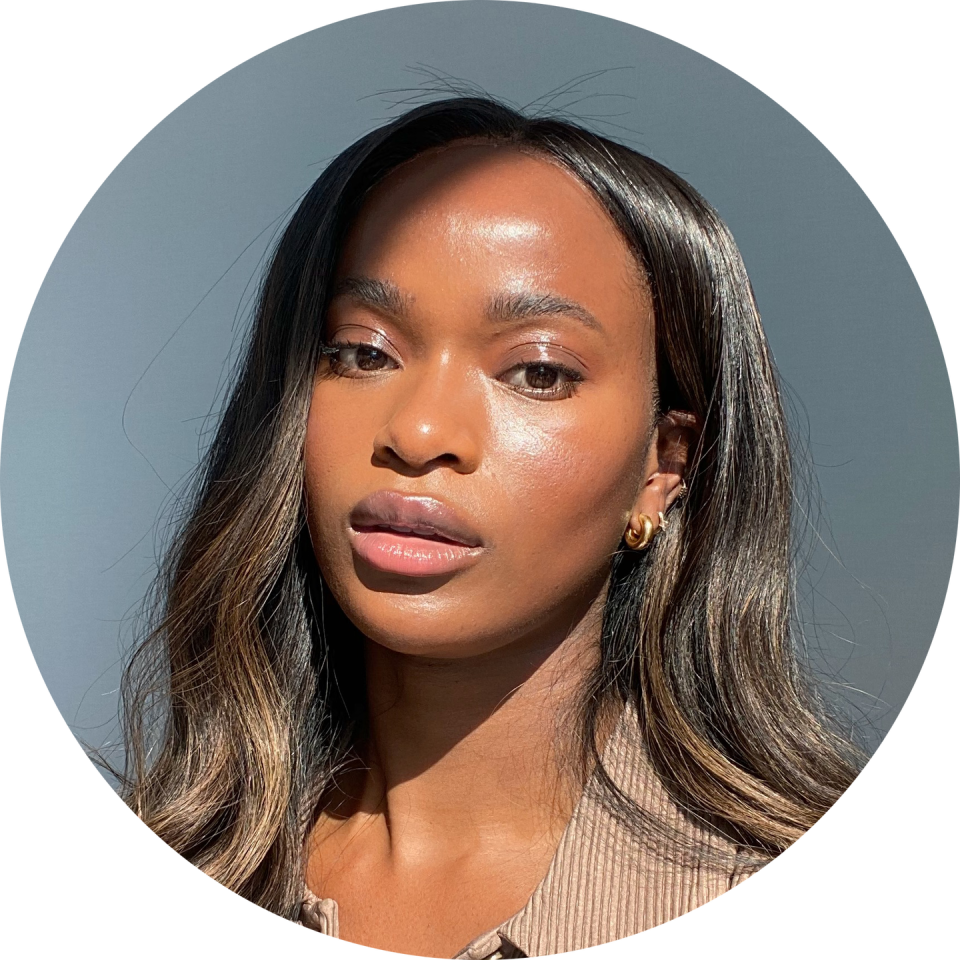Everything You Need To Know About Keeping Your Scalp Healthy

Ingredients known for working wonders in skincare are now heading upwards. Here, the ELLE team share how to reap the benefits for top-notch scalp health...

Katie Withington: Balancing Oily Roots
Before I bleached my own hair, I was misled by the already-blonde-brigade into believing it would mean washing my hair less, the theory being that my strands, with their new-found coarseness, would use their thirst for good and absorb excess oil from my scalp. Sadly, that hasn’t been the case. Instead, I’ve been left with dry, splitting ends and slick, greasy roots.
Much like I do in my regime for my combination skin, I’ve found that spot-targeting my formulas by area is the most beneficial way to approach washing my hair. My routine is dedicated to balancing my oily scalp by targeting the root cause: hormonal fluctuations.
‘An oily scalp frequently stems from overactive sebaceous glands, which produce excessive sebum,’ explains hairdresser Darren Fowler. ‘A genetic predisposition, stress, environmental factors and hormonal fluctuations, particularly an increase in androgens like testosterone, can contribute to this overproduction.’
A clarifying shampoo, like L’Oréal Paris Elvive Hydra Pure, breaks down excess oil and product build-up without stripping my ends of moisture. At three-week intervals, I’ll use the Kérastase Specifique Potentialiste for a scalp refresh; it uses prebiotics and vitamin C to create a healthy-scalp equilibrium. When I need to prolong the time between washes (party season, incoming), I’ll reach for a mattifying treatment mist from Oribe. If in doubt, you cannot go wrong with dry shampoo – it’s an oily-girl fail-safe.

Amelia Bell: Soothing Irritation
Scalp health wasn't always top of my haircare priorities. As a teen, I was hell-bent on using fragranced, sulphate-rich shampoos, torching my ends with crimpers and dousing my chemically processed blonde roots with old-school hairspray.
I’ve since learned the error of my ways and that, whether I like it or not, my scalp is prone to sensitivity. As Andy Jones, Champo’s head of product development, explains, it is now reported that up to eight in 10 people suffer from scalp irritation, which can manifest as anything from flakiness, itchiness and redness or, in more severe cases, dermatitis, eczema or psoriasis.
‘Itchy, irritated scalps can be caused by seasonal changes, hot showers, blow-drying, not fully rinsing away shampoo, not washing hair enough, and letting dry shampoo clog pores,’ he says. ‘There are possible triggers from sulphates, silicones, parabens, artificial colour or fragrance in hair products as well as excess dairy, sugar, spices or alcohol.’ Trichologist Anabel Kingsley adds that ‘an itchy scalp is more likely to occur if your scalp is not producing enough, or not adequately replacing sebum [oil], which tends to happen as we get older.’
My scalp routine now tells a very different story – it’s free of synthetic foaming agents and hidden silicones; it contains a hydrating cleanser and a soothing toner to support scalp health. I’ve added targeted treatments, such as the Living Proof Dry Scalp Treatment and Champo Pitta Growth Serum, with the occasional professional treatment thrown in – I highly recommend Omorovicza’s new signature treatment at Claridge’s, which (finally) makes scalp care feel like a luxurious pursuit, as well as a necessary one.

Medina Azaldin: Easing Dandruff
Your scalp is an extension of the skin on your face, so it’s natural for its condition to mirror your complexion – even if it is only in subtle ways.
My combination-oily skin type manifests as acne-prone on my face, but for my scalp, this means a tendency toward dandruff flare-ups. Caused by the overgrowth of the fungal yeast melassezia, dandruff is often related to drier scalps, but an excess production of oil can also create an optimal condition for it to thrive – leading to itchy, flaky, generally uncomfortable scalps. ‘There is an association with underlying skin conditions such as seborrhoeic dermatitis, eczema and psoriasis, too,’ says consultant dermatologist Dr Aamna Adel. Stress and cold weather can also trigger my dandruff, which is completely common, according to Dr Adel.
While the proliferation of skincare ingredients and products into haircare is beneficial in some ways, I have found that less is more when it comes to managing dandruff. Eleanore Richardson, consultant trichologist at Fulham Hair and Scalp Clinic, recommends keeping your hair and scalp cleansed regularly, and to ‘limit products that sit on the surface of your scalp for long amounts of time’, such as heavy oils, dry shampoos or rich styling products.
Shampoos with ketaconazole (such as Nizoral), zinc pyrithione or selenium sulphide have anti-fungal and anti-inflammatory benefits to tackle persistent flakes, but for my mild flaking, I’m a fan of K18’s clarifying formula. It uses charcoal and salicylic acid to balance oily scalps without leaving strands feeling extra dry. I use it weekly, and in between, I use Sam McKnight’s lightweight shampoo to keep my scalp clean without aggravating it.
Maintaining the scalp’s natural microbiome is also key when it comes to keeping dandruff at bay. Kerasilk’s scalp serum combines probiotics with piroctone olamine, another useful ingredient in combating fungal growth. A spritz a day helps to soothe irritation and keep my scalp happy. But do note, if you’re noticing persistent itching, scabbing, redness or hair shedding, then book in with a registered trichologist who can offer professional help.

Dr Ewoma Ukeleghe: Managing Dry Scalps
Dealing with a dry scalp can be a real head-scratcher – no pun intended – especially for those with curly hair types. Thankfully, there is an increasing array of solutions suitable for our hair needs, beyond ‘greasing your scalp’ with thick pomades, which can be detrimental to scalp health as they create product build-up.
It goes without saying that water intake and diet can influence the severity of a dry scalp in Afro hair, so ensure your meals contain nutrients such as zinc, omega-3 fatty acids, vitamin B and vitamin A, as they all play crucial roles in maintaining your scalp health. High-quality supplementation can help to ameliorate parched scalps as well; I make sure to keep my pantry stocked with Pure Encapsulations and Omega 3 supplements from Nordic Naturals.
As for haircare, I love hairstylist Cyndia Harvey’s This Hair of Mine Scalp Serum. It strengthens strands using pea peptide and apple stem cells, while algae and plant oils deliver much-needed nourishment. I appreciate how it isn’t a water-based formula, so it does not ruin my silk press! On my shelf, you’ll also find Kérastase Specifique Potentialiste Serum, which has soothing probiotics. As I Am Dry & Itchy Scalp Care Oil encourages better growth because it restores moisture, thanks to a cocktail of castor, black-seed and sunflower-seed oils, while rosemary-infused Pattern Scalp Serum offers instant relief. I use them in rotation to not only encourage hydration but also promote overall scalp health. That said, if your dry scalp continues to be an issue, it is worth seeking the advice of a trichologist, such as the experts at Philip Kingsley, who can help nip the issue in the bud.

Chloe Woodland: Encouraging Hair Growth
'You have the healthiest scalp I've ever seen,' marvels Aveda artistic creative education director, Susann Hohlfeld. And since she’s seen hundreds of them in her time – all under an unforgiving 600% magnification, no less – that’s now in my mental pile of ‘niche things to brag about’.
It came with hard work. Eight years of bleaching and straightening had withered my waist-grazing lengths into a bob and wreaked havoc on my scalp. Naturally, I taught myself everything there is to know about growing hair and made one discovery that influenced my hair resurrection: you can’t ‘speed up’ how quickly your hair grows; but you can create the optimal conditions for growth at the scalp.
Achieving this begins with weekly exfoliation. There are both chemical and physical (read: gritty) formulas to choose from, but the latter is my favourite for a deep cleanse. They make light work of sloughing away dead skin cells and product build-up, and stimulating hair follicles. When I’m not using a scrub, I use a scalp brush while I shampoo my hair to extend the invigorating benefits.
My heat-styling habits have also been overhauled. Having frizzy waves means going cold-turkey isn’t an option, but I’m mindful of how I use electricals. Besides using ample heat protection, I’m a fan of Dyson’s Supersonic Nural, with adaptive temperature controls that prevent the scalp getting too hot during styling. Smart.
It all requires consistency. Anyone on TikTok will have seen the clamour over rosemary oil in the last year, and it’s something I apply to my scalp every week. While there’s little clinical evidence to support its efficacy, I am certainly seeing success from regular use. Maybe it’s magic; maybe it’s deep hydration combined with a good scalp massage. I’m not too concerned with the why – just with how good my hair looks now. Bragging again, sorry.
ELLE Collective is a new community of fashion, beauty and culture lovers. For access to exclusive content, events, inspiring advice from our Editors and industry experts, as well the opportunity to meet designers, thought-leaders and stylists, become a member today HERE.
You Might Also Like

